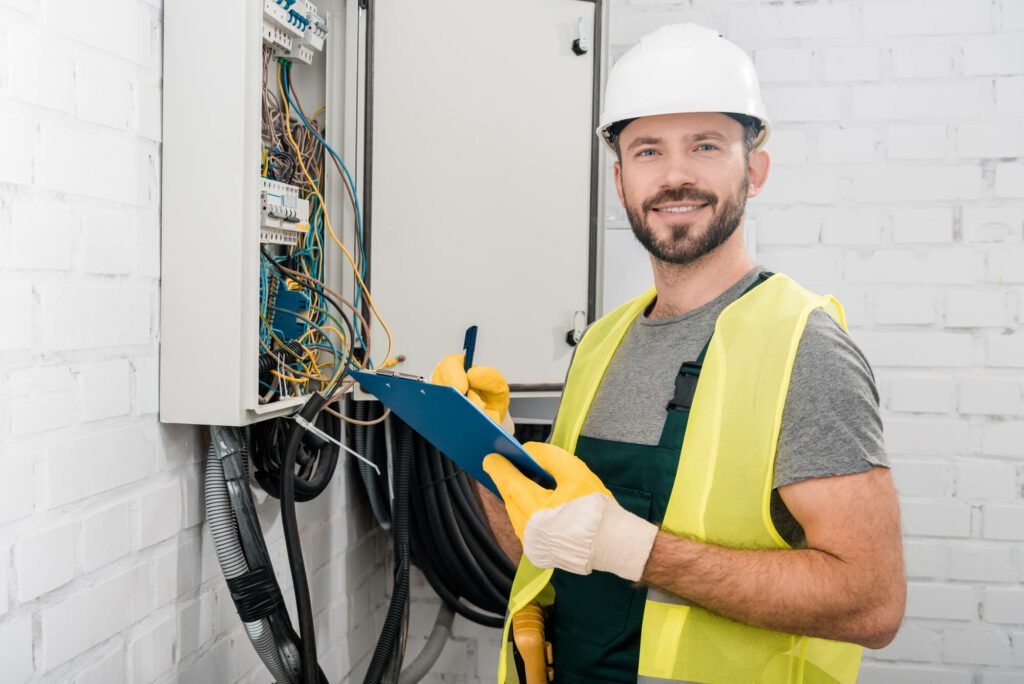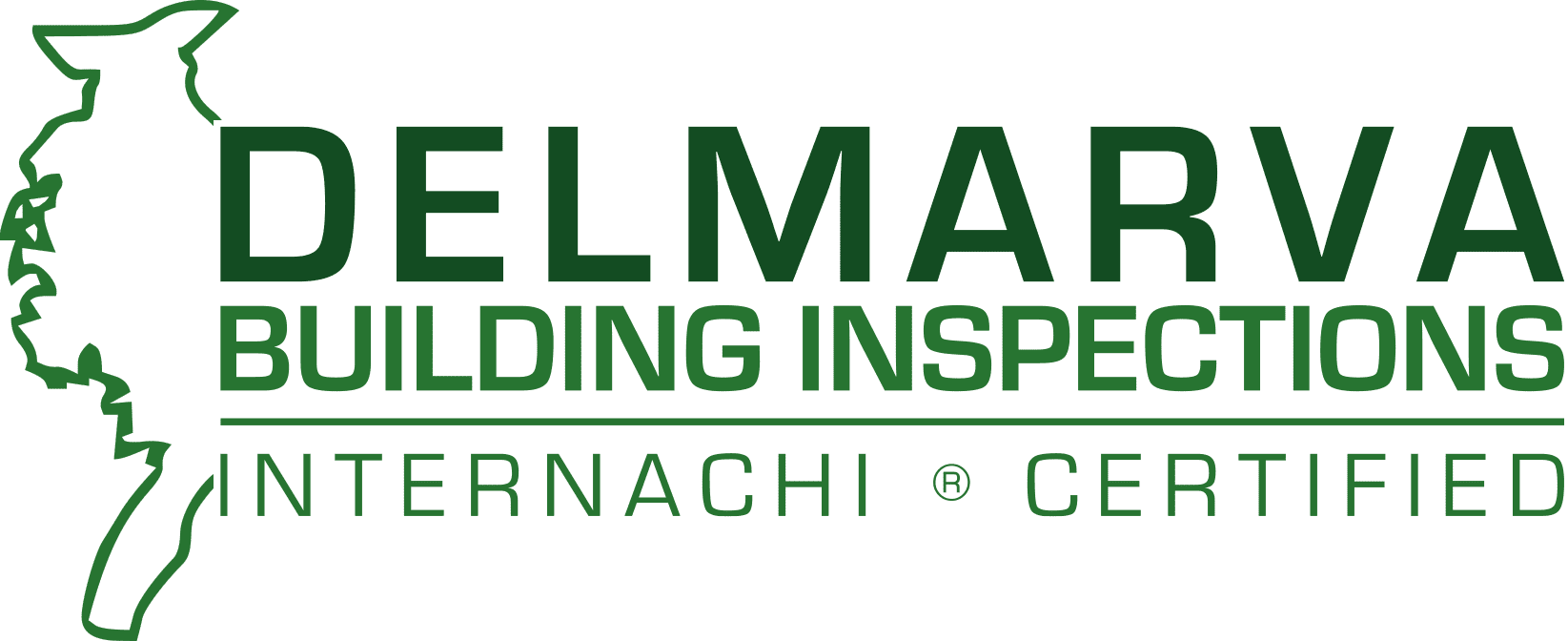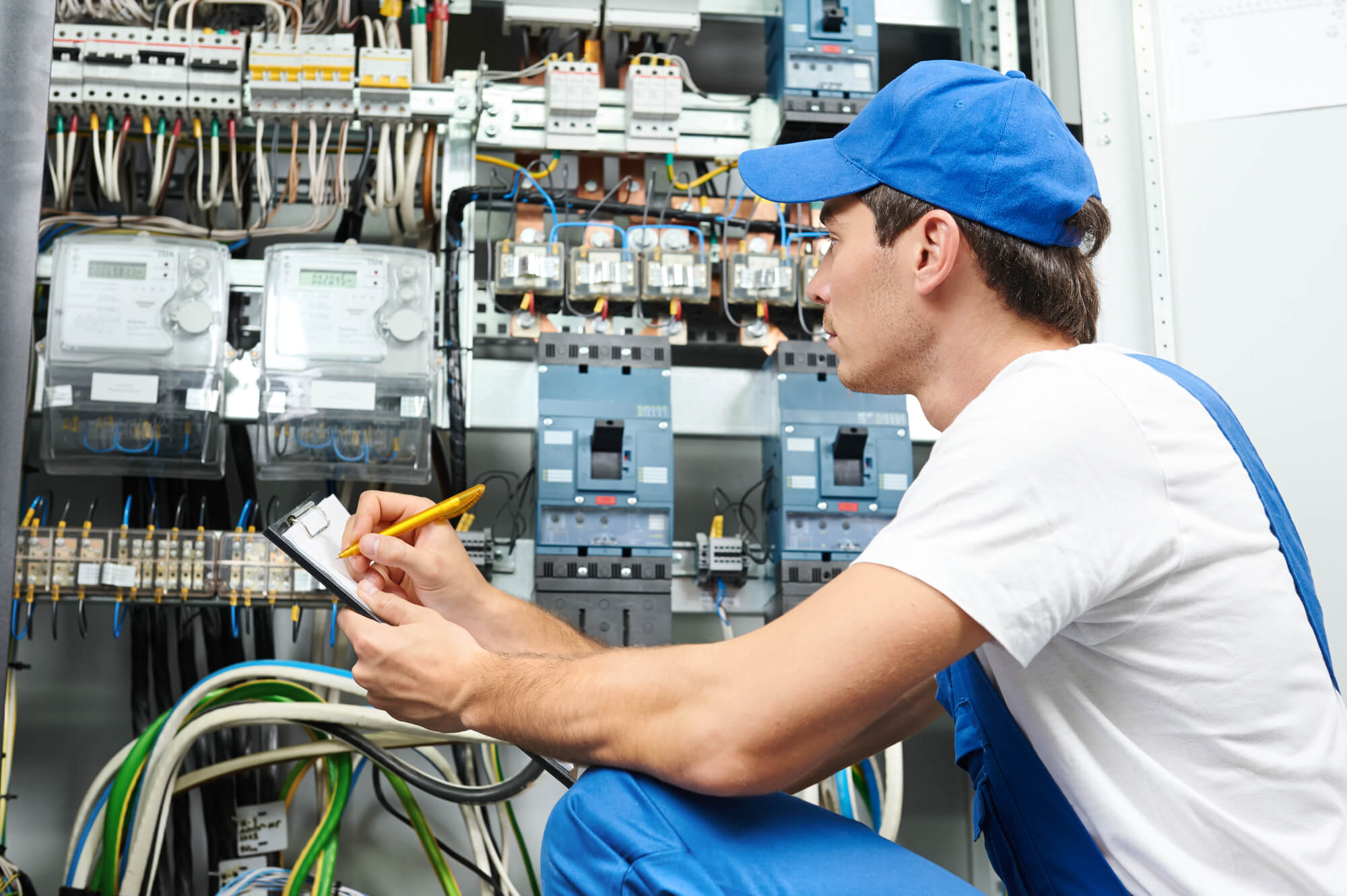Home inspections typically follow a standardized process to inspect the electrical system in a home. Here are the general steps involved:
Visual Examination:
The inspector will start by visually examining the electrical system. Next, they will look for any visible issues, such as exposed wiring, damaged electrical panels, outdated or faulty fixtures, and signs of improper installations.
Testing:
The inspector will use specialized tools such as a voltage tester, circuit analyzer, or infrared camera to perform various tests and measurements. These tests help identify potential problems, check for proper grounding, and assess the system’s overall safety.
Electrical Panel Inspection:
The electrical inspection will include a crucial component, also known as a breaker box. The inspector will open the panel and examine the wiring, breakers, fuses, and overall condition. In addition, they will check for proper labeling, adequate capacity, and any overheating or electrical arcing signs.
Outlets and Switches:
The inspector will check multiple outlets and switches throughout the house to ensure they function properly. In addition, they will test for polarity, grounding, and the presence of ground-fault circuit interrupters (GFCIs) in required locations such as kitchens, bathrooms, and outdoor areas.
Lighting Fixtures:
The inspector will examine the light fixtures to ensure they are securely installed and in proper working condition. They will also check for potential fire hazards, such as using bulbs with incorrect wattage in fixtures.
Wiring Assessment:
The inspector will assess the wiring throughout the house, primarily focusing on visible areas like the basement, attic, and accessible crawl spaces. In addition, they will look for any exposed or damaged wiring, outdated aluminum wiring (if applicable), and signs of DIY electrical work that may not meet safety standards.
Grounding and Bonding:
The inspector will verify that the electrical system has proper grounding and bonding. This includes checking grounding electrodes and the grounding conductor and ensuring the bonding of metal components such as water pipes, gas lines, and structural elements.
Code Compliance:
The inspector will assess whether the electrical system meets the local building codes and safety standards applicable at the time of installation. For example, this includes considerations such as the number and placement of outlets, arc fault circuit interrupters (AFCIs), and smoke detectors.
Report:
After completing the inspection, the home inspector will compile a detailed report summarizing their findings. The report may include identified issues, safety concerns, recommendations for repairs or further evaluation by a licensed electrician, and general observations about the electrical system.
Note that the scope of a home inspection may vary depending on the inspector, the region, and the type of property inspected. Additionally, a home inspector is not a licensed electrician, so if significant electrical issues are discovered, they may recommend further evaluation or repairs by a qualified electrician.
Is There A Difference Between Inspecting A Building’s Electrical Verses Inspecting A Home’s Electrical System?
Yes, there are some differences between inspecting the electrical system of a building and a home. These differences primarily arise due to variations in scale, complexity, and the specific electrical requirements of each property type. Here are a few key distinctions:
Scale and Complexity:
Building electrical systems tend to be larger and more complex compared to residential systems. Commercial buildings often have higher electrical loads, multiple distribution panels, extensive wiring networks, and additional components like transformers, switchgear, and motor control centers. Therefore, inspecting a building’s electrical system requires a broader understanding of industrial-grade equipment and electrical distribution principles.
Load Calculation and Demand Factors:
Commercial buildings have different electrical load requirements based on their occupancy type, purpose, and the equipment they house. Inspecting a building’s electrical system involves evaluating load calculations, demand factors, and ensuring that the electrical infrastructure can support the intended usage and equipment.
Code Compliance:
Electrical inspections must comply with local building codes specific to commercial or industrial structures. These codes may have different requirements compared to residential codes, addressing issues like electrical distribution, grounding, emergency power systems, accessibility, fire protection, and other specialized systems.
Safety Systems:
Commercial buildings often have additional safety systems that need inspection, such as fire alarm systems, emergency lighting, exit signs, and smoke management systems. Inspectors must assess these systems’ functionality, integration, and compliance with applicable regulations.
Specialized Equipment:
Depending on the nature of the building, there may be specialized electrical equipment that requires inspection. Examples include HVAC systems, industrial machinery, elevators, data centers, and manufacturing equipment. Inspecting these systems may involve understanding their electrical requirements, control systems, and specific safety considerations.
Energy Efficiency:
Building electrical inspections may focus on energy efficiency aspects, including evaluating lighting systems, electrical loads, power management, and the use of energy-saving technologies. In addition, inspectors may assess the effectiveness of energy management systems and provide recommendations for optimizing energy consumption.
While the fundamental principles of electrical inspections remain the same for both buildings and homes, the scope, scale, and specific requirements vary. Inspectors who specialize in commercial or industrial electrical systems often have specialized knowledge, training, and experience in these areas to ensure a comprehensive and accurate evaluation of the building’s electrical infrastructure.
Our Team Of Highly Skilled Inspectors Is Equipped To Handle All Types Of Inspections
At Delmarva Inspections Group, we understand that commercial electrical inspections and home inspections are distinct processes with unique considerations. Our team of highly skilled inspectors is equipped to handle both types of inspections, recognizing the key differences between commercial and residential electrical systems.
Regarding commercial electrical inspections, we go beyond the scope of residential inspections. We delve into the intricacies of industrial-grade equipment, expansive electrical distribution networks, and compliance with specific building codes tailored to commercial and industrial properties. Our inspectors possess the expertise necessary to evaluate load calculations, demand factors, and the capacity of the electrical infrastructure to meet the demands of various occupancies and specialized equipment.

All Electrical Inspections Are In Compliance With All Management Systems
We understand the importance of safety systems in commercial settings. That’s why we meticulously assess fire alarm systems, emergency lighting, exit signs, and smoke management systems to ensure compliance with regulations and promote a secure environment for employees and visitors. In addition, our commercial electrical inspections address energy efficiency aspects, providing insights into optimizing electrical systems for reduced energy consumption. By evaluating lighting systems, electrical loads, and energy management technologies, we help businesses make informed decisions toward sustainability and cost savings.
Electrical Inspection Reports Get Tailored To The Property’s Specific Requirements
While commercial electrical inspections encompass broader and more complex systems, our residential inspections remain equally comprehensive. We diligently examine the electrical infrastructure, outlets, switches, lighting fixtures, and electrical panels to ensure safety, compliance with local codes, and proper functionality.
Our commitment to excellence extends to both commercial and residential inspections. We deliver detailed reports for each inspection tailored to the property’s specific requirements.
Our goal is to provide valuable insights, identify potential issues, and empower our clients with the information they need to make informed decisions. When it comes to commercial electrical inspections or home inspections, Delmarva Inspections Group is your trusted partner. Contact us today to experience our expertise, professionalism, and dedication to ensuring electrical safety and compliance for your property.


















